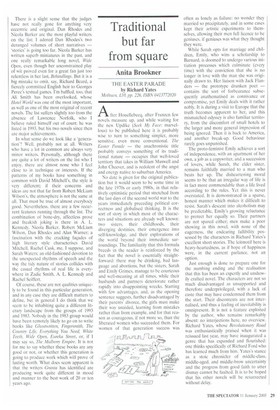Traditional but far from square
Anita Brookner
THE EASTER PARADE by Richard Yates Methuen, £10, pp. 226, ISBN 0413772020
After Houellebecq, after Franzen few novels measure up, and while waiting for the new Updike (Seek My Face: marvellous) to be published here it is probably wise to turn to something simpler, more sensitive, even more conventional. The Easter Parade — the anachronistic title probably conveys something of its traditional nature — occupies that well-loved territory that takes in William Maxwell and John Cheever, and is redolent of the angst and energy native to suburban America.
No date is given for the original publication but it would seem to be some time in the late 1970s or early 1980s, in that relatively optimistic period that stretched from the last days of the second world war to the years immediately preceding political correctness and globalised thinking. It is the sort of story in which most of the characters and situations are already well known: two sisters, their childhoods, their diverging destinies, their emergence into self-knowledge, and their explorations of the world beyond their immediate surroundings. The familiarity that this formula breeds in the reader is reinforced by the fact that the novel is essentially straightforward; there may be drinking, had language and abortions, but the sisters, Sarah and Emily Grimes, manage to be courteous and well-meaning at all times, while their husbands and partners deteriorate rather rapidly into disappointing wrecks. Starting with few advantages, and, as the opening sentence suggests, further disadvantaged by their parents' divorce, the girls must make their way unaided, learning from mistakes rather than from example, and for that reason as courageous, if not more so, than the liberated women who succeeded them. For women of that generation success was
often as lonely as failure: no wonder they married so precipitately, and in some cases
kept their artistic experiments to themselves, allowing their men full licence to be geniuses, if geniuses was what they thought they were.
While Sarah opts for marriage and children, Emily, who wins a scholarship to Barnard, is doomed to undergo various initiation processes which culminate (every time) with the conviction that she is no longer in love with the man she was originally drawn to. Her liaison with Jack Flanders — the prototype drunken poet — contains the sort of forbearance subsequently anathematised as connivance or compromise, yet Emily deals with it rather nobly. It is during a visit to Europe that the truth becomes apparent to her, and this mismatched odyssey is also familiar territory, from the discomfort of small hotels to the larger and more general impression of being ignored. Then it is back to America, and another break-up. Good behaviour rarely goes unpunished.
The proto-feminist Emily achieves a sort of independence, with an apartment of her own, a job as a copywriter, and a succession of lovers, while Sarah, the elder sister, remains faithfully married to a man who beats her up. The disheartening moral seems to be that an irregular way of life is in fact more commendable than a life lived according to the rules. Yet this is never overstated. It is demonstrated in a sparse, honest manner which makes it difficult to resist. Sarah's descent into alcoholism may be predictable, Emily's growing reluctance to protect her equally so. Their partners are not spared either; men make a poor showing in this novel, with none of the eagerness, the endearing fallibility possessed by the characters in Richard Yates's excellent short stories. The leitmotif here is heavy-heartedness, as if hope of happiness were, in the current parlance, not an option,
Just enough is done to prepare one for the numbing ending and the realisation that this has been an expertly and unshowily crafted novel. The characters are not so much disadvantaged as unsupported and therefore underprivileged, with a lack of caste that may have condemned them from the start. Their discontents are not internalised, and thus a feeling of inevitability is omnipresent. It is not a feature exploited by the author, who remains remarkably absent: no interjections here, no overview. Richard Yates, whose Revolutionary Road was enthusiastically praised when it was reissued last year, may have inaugurated a genre that has expanded and flourished: one thinks specifically of Richard Ford who has learned much from him, Yates's stance as a stoic chronicler of middle-class, middle-aged, and middle-brow uncertainty and the progress from good faith to utter dismay cannot be faulted. It is to be hoped that his other novels will be resurrected without delay.


























































 Previous page
Previous page